artist Tonya Lutz sculpts a new tile design by hand.
Co-owners Tonya and Rick
Our gallery features Regional & national artists
Whistling Frog Tile Company is a collaboration of artists: Rick Pruckler & Tonya Lutz. Our hands are on the work from start to finish.
Whistling Frog was founded in 1986 by Rick Pruckler. Creative by nature, he was involved in tile projects and installation pieces, like the Michigan Welcome Center mural at the Mexicantown Bagley Bridge with renowned Detroit artist Hubert Massey, People Mover murals in Detroit with historic Pewabic Pottery, as well as years of instructing students in the art of ceramics. Additionally, he had the experience of hand-crafting the look and feel of a few of the contemporary vase designs and glaze formulas used today by Pewabic. After this, Rick knew he wanted to create a place where he could allow his artistic expertise to evolve unhindered. Thus, Whistling Frog Tile began.
With this new-found freedom, designs came to life, incorporating elements of nature, ceramic technique, and beautiful contrast. The architectural tile work was equally striking, utilizing techniques, custom glaze formulas, and unique design elements to create aesthetically beautiful spaces and inspire the senses.
In 2011, Rick partnered with sculptor Tonya Lutz, a graduate of WSU, BFA with honors. The addition of her work ethic and original perspective allowed Whistling Frog’s tile line to expand even further. On the business side, she handles the admin & all that entails. On the artistic side, she introduced tile narratives featuring woodland creatures, cats, dogs, & the Destination tile series. Instituting the donation policy, Whistling Frog now helps protect public spaces in our natural world, with the sale of each and every art tile, like a business should.
Rick’s extensive experience formulating custom glazes creates a one-of-a-kind color palette. It features fresh, bright, beautiful colors and finishes. He has the technical knowledge for: CNC, CAD design, 3-D printing & scanning, website design, and tile layouts.
All clay and glazes are crafted using sustainable practices. Packing supplies & glaze containers are up-cycled for minimal environmental impact, and as much surplus clay and water as possible are conserved and recycled. If a tile is broken, even these are up-cycled. Find them tucked into public art murals around Detroit.
Whistling Frog Tile studio began in Ferndale, Michigan. Ferndale is a caring, festive, and vibrant little community hugging the border of Detroit. Since then, each hand crafted piece is now made in the new studio/ storefront up at Torch Lake or in Ferndale, depending on where they are at the moment.
Today, Rick and Tonya are artists who enjoy their work. Every aspect of the business and art is accomplished by their hands. At least for now. It’s interesting to contemplate just being artists. For them, creating tile is more than a process; it’s a passion and a joy. They are the designers, sculptors and makers caring about every step, from your email that gets answered to the happy little tile package that arrives on your doorstep.
Rick and Tonya value promoting appreciation and awareness for the environment, native wildflowers and plants, endangered species, historical places, and communities through their unique designs. By celebrating and elevating their subject’s importance through art, they create pieces with meaning and vitality. This level of passion and dedication provides the essence that goes into each of Whistling Frog Tile's beautiful handmade pieces.
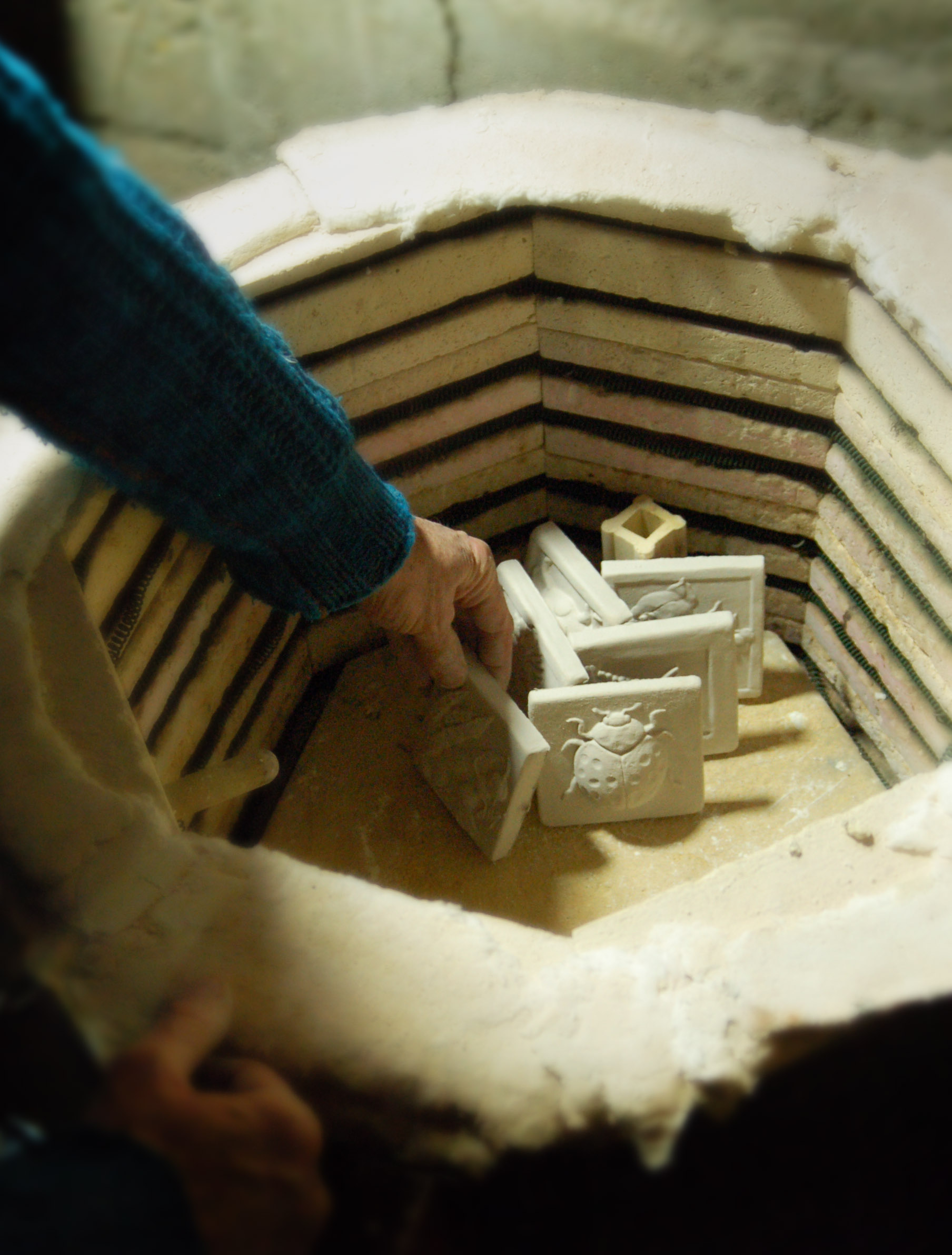

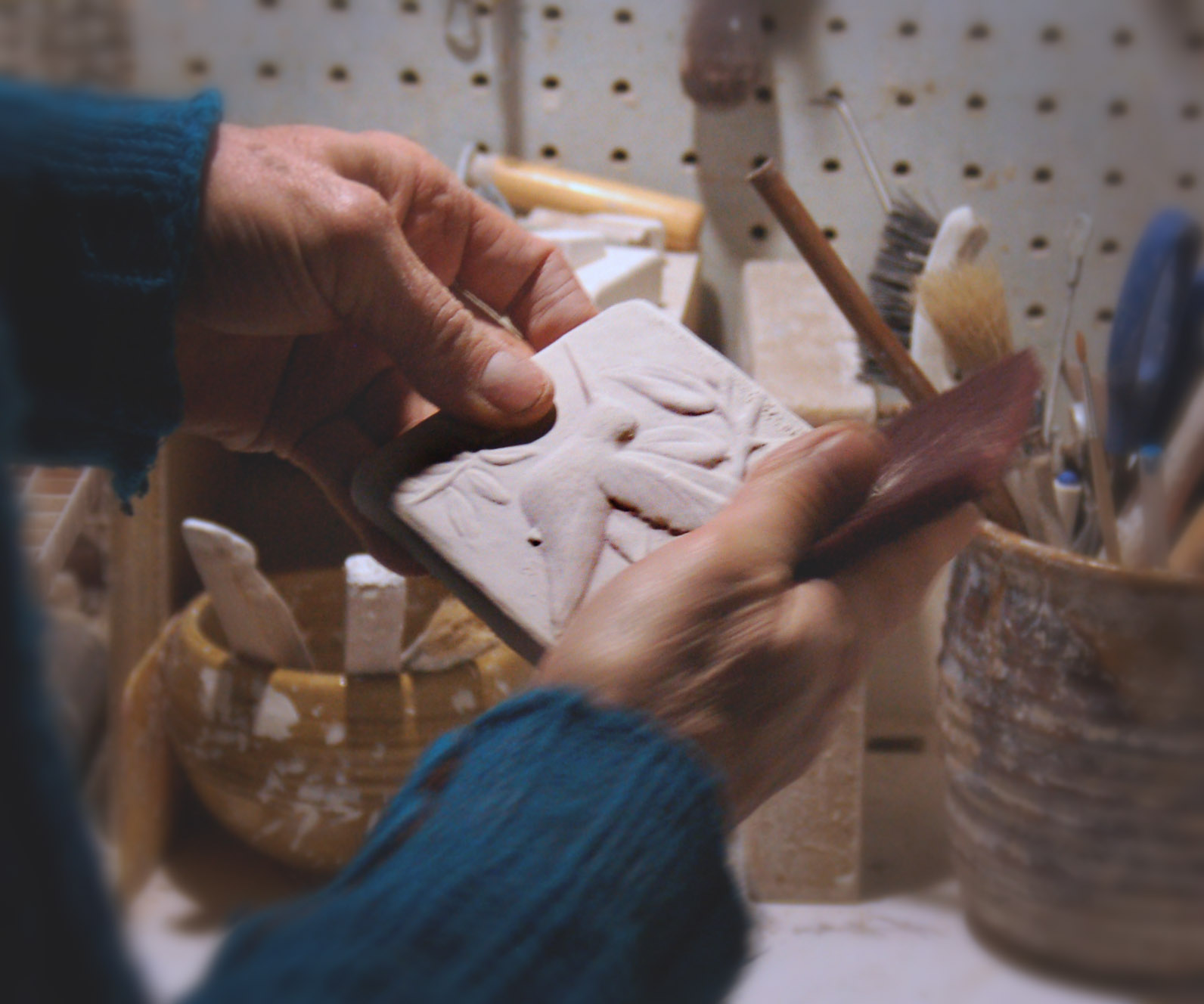
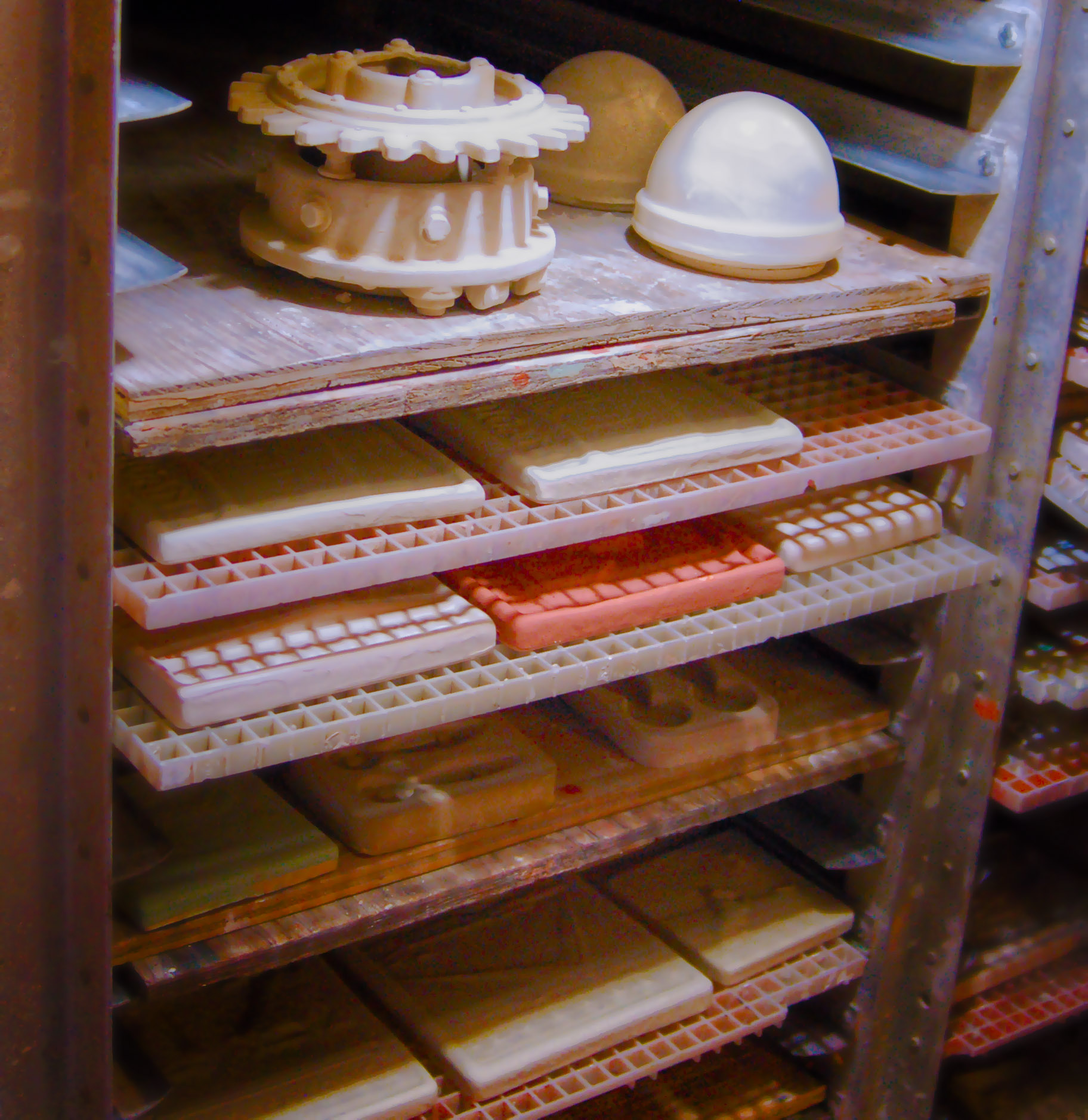
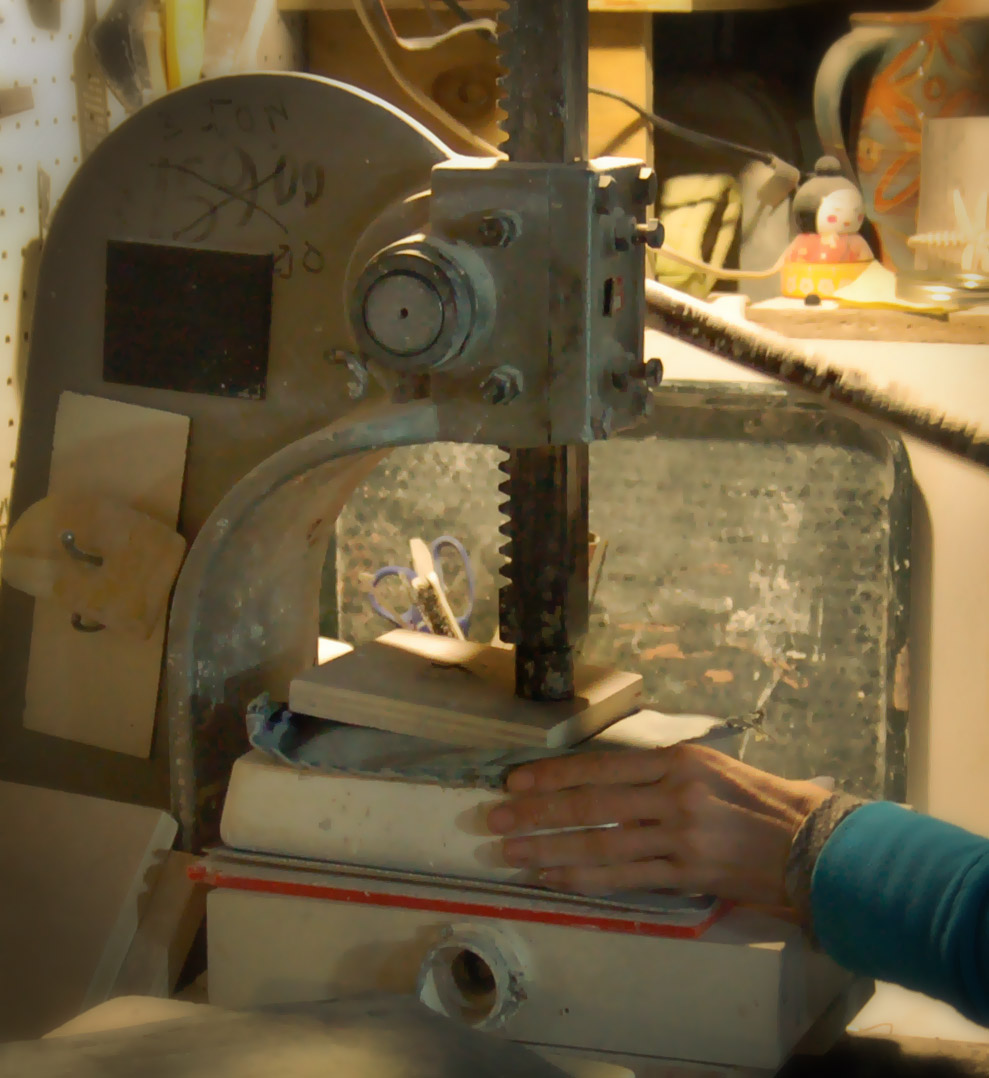
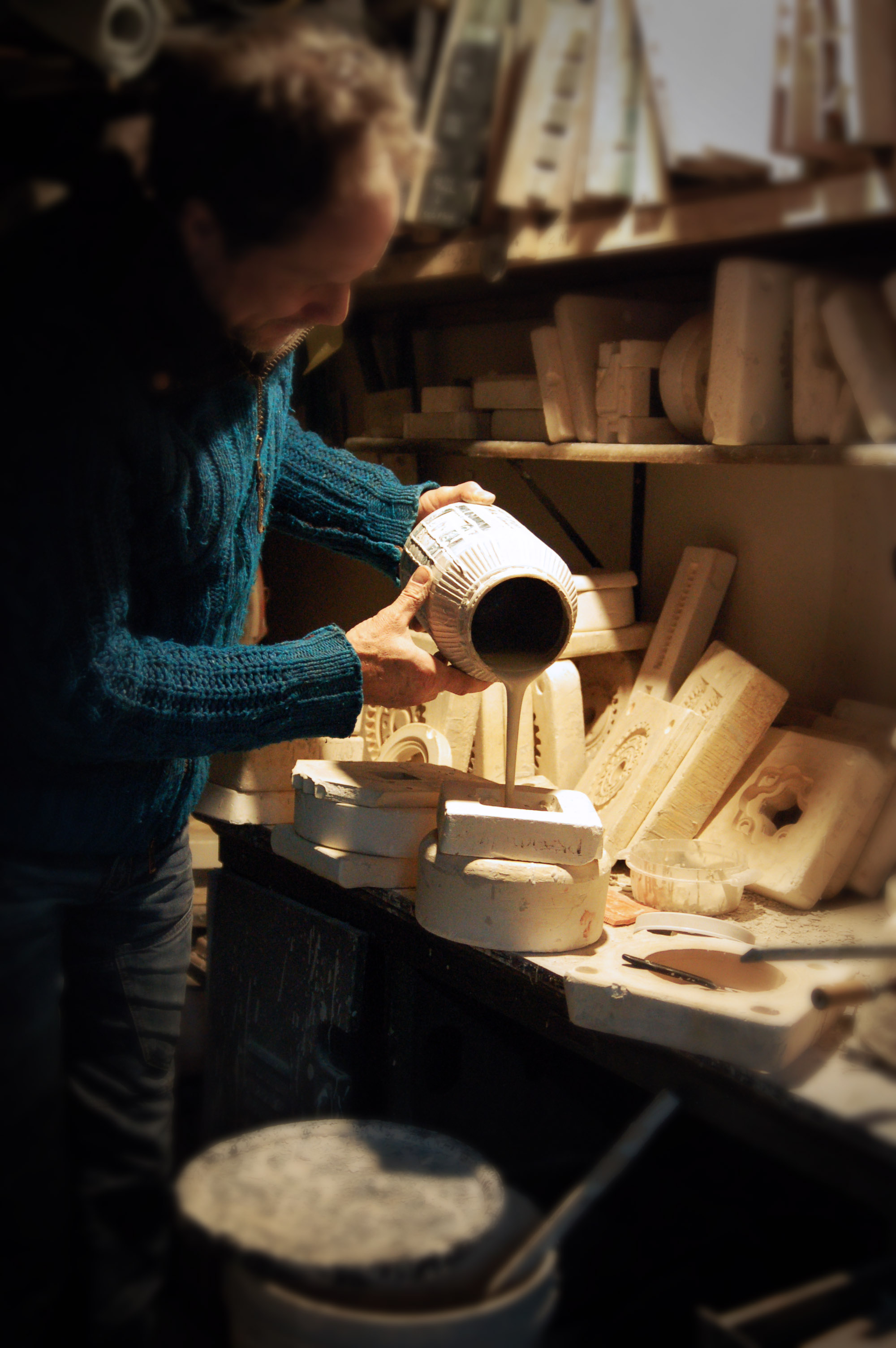
Whistling Frog Tile Company: The Story Behind The Name
While relaxing on the beach in Bermuda, around the year 1998, Rick Pruckler was thinking about what to name his tile company. He had many ideas, but what would convey the feel of his original designs, the fact that he makes all his own glazes and clay, and made each tile by hand in his studio?
The gentle beach breeze made the naming process enjoyable, save for some persistent jungle noises. However, he had a hard time trying to find the right words. Rick had already started making tile and selling under the name ‘Tapas’ pottery. He chose this name because of its East Indian roots and it meant literally, ‘fire of transformation.’ Spanish cuisine was becoming more widely enjoyed then in the ‘90’s and the Spanish dish also known as tapas was becoming prevalent. So, as Rick watched as the waves rolled in, he knew the name ‘Tapas’ wouldn’t last.
Birds chirped their condolences from the palms. He figured this was for the best, since the Indian term refers to a spiritual transformation. Lots of difficulty could be brought on in the kiln room by asking for this, and he wanted the whole process to be more like a song. Speaking of song, the jungle sounds increased, causing his brainstorming session to be interrupted. As the sun descended and a fiery sunset crept across the sky, Rick was thinking that ‘Burnt Clay’ might be a good name. The darkened trees were alive with the piercing sound of animal calls. He tried to concentrate, scratched his head, and covered his ears. Late ‘80’s terms kept bubbling up, vying for attention: ‘Rampant’ tile? ‘Emerge’ Tile? What were these names even saying? And for the love of all, what is that confounded sound?
A mildly curious local inhabitant had been watching his distress from afar on the beach. He called out in the twilight, “Whistling frogs… they're okay!”
And on the advice of that kind and helpful man, Rick had the name of his company.
BErMUDA Sunset
Lesser Antillean Whistling Frog (Source: http://www.dcnanature.org)
The Original Whistling Frog Logo, complete with hand drawn font by Artist and founder rick pruckler. This beautiful mark is our symbol of authenticity, hand-stamped on the back of each genuine whistling frog tile.
Whistling Frog Tile in The Northern Express of Traverse City, MI
AN ESTEEMED TILE-MAKING DUO’S LEAP NORTH
FROM DETROIT’S FAMED PEWABIC POTTERY AND WSU’S FINE ARTS TO ALDEN’S WHISTLING FROG
BY ROSS BOISSONEAU | FEB. 27, 2021
Moving to a new home and business location isn’t easy. Doing so months before a pandemic shuts everything down — that definitely doesn’t make for a smooth transition. But that’s just what Rick Pruckler and Tonya Lutz did, migrating from Ferndale to northern Michigan.
Like so many others, they’d vacationed in the area, and when the couple decided to move north, they brought their business, Whistling Frog Tile Company, with them. From their new home in Alden, they create and sell decorative tiles. Dog tiles, cat tiles, bird tiles. Industrial shapes, images from nature, alphabets, destinations — they’re all fair game for the two artists.
CITY-HONED SKILLS
Pruckler’s interest in ceramics took him from Iowa to the University of Michigan, where he earned his master’s in ceramics. He then landed a job at the famed ceramic studio Pewabic Pottery in Detroit. Housed in a 1907 Tudor Revival building (designated a National Historic Landmark), the studio and school offers classes, pottery made in-house, and design and fabrication services for both public and private buildings.
Pruckler had worked there for decades, until the pandemic reared its ugly head. “I got a job [there] and had been there ever since, until COVID shut things down. In 1986, I worked on the People Mover. I was teaching down there, too,” said Pruckler.
He also learned tile-making and began doing his own designs on the side, which became Whistling Frog in 1987. In 2011, he was joined by Lutz, a graduate of Wayne State University’s fine arts program and a sculptor by training. “I learned the craft at Wayne State, graduated, and hit the ground running,” she said.
Together the two worked in Ferndale, where Pruckler had established a studio. “In the early ’90s there were a lot artists there, a lot of art,” he said.
VENTURING OUT
Over the years, Pruckler was able to lend his talent to numerous public art projects, such as the People Mover and the Michigan Welcome Center mural at the Ambassador Bridge. He worked with renowned Detroit artist Hubert Massey on the lattermost.
Still, they wanted to find a way to ensure income from their tile-making. They tried the tradeshow route in 2014 and failed to make a dent. Then they researched and emailed galleries across the country that they felt would be a good fit for selling their tiles. The response: Zilch.
So they went old school. They took their online research and once again contacted galleries they thought appropriate, this time via colorful snail-mailed postcards that showcased their work. Third time’s the charm: Their tiles are now displayed at nearly 100 galleries and museum shops across the country.
They also sell tiles online through their website and on Etsy, and their home and studio is also a retail shop. “I’ve been through downturns, so I’m always looking for different sources of income,” said Pruckler. “Tonya had done Etsy. That saved us.”
Their business demands eventually outstripped their space in Ferndale. “We outgrew our home. We were running the business out of the basement and garage,” said Pruckler.
A FLYING LEAP
So they began looking for a new location and decided to take a leap of faith. “We vacationed up here and were looking for a little place,” said Lutz. They were hoping to find a location that would enable them to work and live on the same site, and ultimately found a place in Alden they thought might work. “We turned around in the lot here, and thought, ‘Well, it’s for sale.’ In August 2018, we purchased it and opened July 4, 2019,” she said.
Even with their multi-pronged marketing and sales approach, when the pandemic hit some seven months after their opening, the two weren’t sure what the future held. “March was quiet,” admitted Lutz.
“It scared us to no end,” added Pruckler.
While the shutdown limited income opportunities, it also offered an opportunity. Because they live in their studio space, they suddenly had more time to create. “For artists, being locked down to the studio is not punishment,” said Pruckler. And soon enough, the orders soon started trickling in online. As the months wore on, they were able to reopen their shop (as long as patrons wore masks).
ART IN ACTION
The process at Whistling Frog was and is completely hands-on. Each piece is handcrafted by the two, from making the molds to firing and finishing them. The clay and glazes are all crafted using sustainable processes.
They also make sure they give back, with a portion of the profits from each tile sold going to a non-profit. Each line goes to a different charity, from local organizations such as Grass River Natural Area and Torch Conservation Area to the Detroit Institute of Art, the Ferndale Public Library and the Alliance for the Great Lakes. As an example, every dog tile sold generates $1 for PADs for Parkinson’s, a research program which trains dogs to detect Parkinson’s Disease.
The duo is quick to praise the others in the area. “Other tile-makers are doing great work,” said Lutz, citing Little Traverse Tileworks and Sporck Tileworks.
“We all have our own unique styles,” noted Pruckler.
OPEN FOR VISITORS
Their studio/shop/home is open 11am to 5pm Thursday through Monday or by appointment at 11991 SE Torch Lake Dr., in Alden. They also still maintain their Ferndale location, as Pruckler continues to work with Massey and on other projects downstate.
Though he’s been doing it for more than 30 years, Pruckler has no intention of slowing down. “It’s always different. Every day there’s some new creative challenge,” he said. “It keeps me engaged.”
Lutz agreed, pointing to the input from customers as a key to keeping the business thriving and the two of them enthused. “The best ideas come from customers,” she said. As an example, she cited the dog tiles. Many of them were suggested by customers who wanted their own breed recognized. “Seeing their ideas come to life is daily affirmation.”











